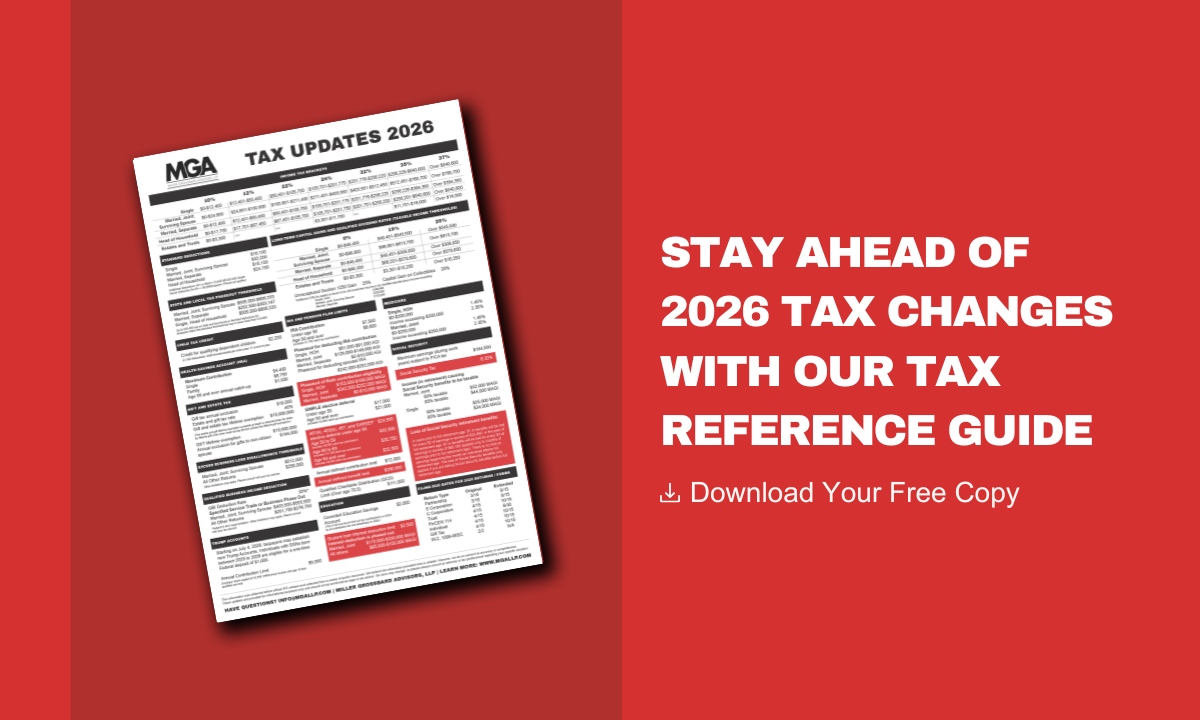Solar is the rising star in the energy world. In 2016, the number of solar installations doubled and represented the largest group of electrical energy producers in the United States.
This is thanks in part to the Solar Investment Tax Credit (ITC) created in 2006. Anyone installing a solar energy system can claim 30% of the cost of the system and its related costs, such as installation and the on-site preparation, as a tax credit. The tax credit reduces your tax liability dollar for dollar, but it is a non-refundable credit. This means the credit can offset your tax liability down to zero, and any unused credit carries forward to future years
But how do you take advantage of this tax credit? Our team at MGA is committed to providing you with clear, simple explanations of very complex happenings within the tax world. In this blog, we dive into the basics of the solar investment tax credit and how this tax credit can benefit you.
First and Foremost, Do You Qualify for the Solar Investment Tax Credit?
If you own property with solar electric or solar water heating systems installed, you are eligible for the tax credit.
However, this is only available to you if you own the property and maintain it as a residence. If the property is strictly a rental property, for example, you cannot claim the tax credit.
You can claim the tax credit for properties that are not your primary residence as long as you own the property and live in it for part of the year. Think second homes or vacation homes, for example.
How Much Credit Are You Allowed to Claim?
Unfortunately, in the next few years, the tax credit will get smaller. In 2020 it will drop from 30% to 26%. In 2021 it drops even lower to 22%, and after that, it will drop to 10% for commercial properties and 0% for private residences.
But through 2019, you can still claim 30% of the eligible cost as a tax credit. This applies to both commercial property owners and homeowners for now.
The solar energy credit is nonrefundable, so you need to have enough tax liability to absorb the tax credit fully. Any unused ITC will be carried forward to future years until it is fully utilized.
Other Costs That Count
Installing any kind of solar equipment can be an onerous and expensive task. You need people who know what they're doing. Electricians, plumbers, and carpenters are among the experts you might need to hire.
You can deduct the labor costs of what these experts charge you. You can also tally up the cost of surveying pipe conduits and architectural analysis. Unfortunately, you cannot include any loan interests in the installation costs. If you pay for the system and installation costs using Home Equity Line of Credit, you may get a tax deduction for the interest payments.
Also, ask your tax preparer if your home's sales tax can factor into the deduction.
So, Is Solar Worth It?
The hype around solar is real. You feel like you're contributing to the cause and fixing the global energy crises just by installing equipment. But you really should weigh the cost vs. benefits of such an undertaking.
One of our team members recently installed a solar panel in her home in Dallas, TX, and here is a little summary of her results.
Total installation cost was around $27,000, so she is claiming $8,100 as a residential energy credit on her 2018 tax return. Since her tax liability exceeds the credit amount, she is getting a full refund of $8,100 which she plans to use to pay down the loan she took out for the solar panel installation.
She paid 10% of the system cost, $2,700, as a down payment and took out a loan with a 3% interest rate to pay for the remaining balance. The home value was increased by $27,000, but her property tax was not increased by the added value because solar panels are exempt from home valuations for tax purposes in most states except Idaho, Nebraska, Nevada, and Ohio. Her projected energy saving for the next 25 years is around $41,000 in addition to the increased home value.
Solar Is Totally Worth It
At least according to our one personal case study, solar is totally worth it. It's not just the Solar Investment Tax Credit that says so. If you're looking for more trusted tax advice, we are here for you. Give us a call.
We are here to make the complex simple.
.png?width=191&name=mgalogofinal-01%20(3).png)





